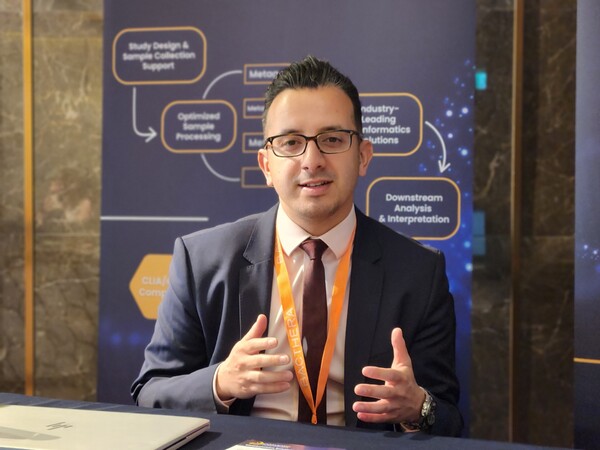Regulatory bodies like the FDA require the genomic sequence of the strain to ensure there are no plasmids, phages, or antimicrobial resistance (AMR) genes and this is where we can support Korean live biotherapeutic products (LBP) companies, said an expert in the microbiome industry.

Korea Biomedical Review spoke to Mo Langhi, Senior Director of Business Development at Cosmos ID, on the sidelines of Microbiome Connect Asia concerning the company’s next-generation sequencing (NGS) microbiome analysis platform.
CosmosID is a provider of multiomics-based microbiome solutions that analyzes data from a wide range of different sample types to help companies, universities, and researchers worldwide better understand the microbiome.
“We've been participating in Microbiome Connect conferences for several years and we're excited to be participating here at the Microbiome Connect Asia conference to meet with Korean researchers and companies that are trying to leverage the microbiome to improve human health,” said Langhi.
‘The genomic sequence of the microbiome strain is a regulatory requirement’
“Our core focus at the moment is leveraging genomics, metatranscriptomics, and metabolomics to solve microbiome issues,” Langhi said.
He explained that genomics studies play a vital role in unraveling the intricacies of the bacteria or microbiome community. Such studies aid in not only identifying the organisms present but also in comprehending their functional capabilities.
He said transcriptome studies enable an understanding of which genes are expressed and the functional activity of the community.
His company also leverages metabolomics to study the downstream metabolites and chemicals that are produced as a result of those processes.
“We help LBP companies understand how their candidate strains are behaving in certain environments and how they impact the host through human simulations or mouse microbiome in vivo studies,” he said. “We can also support pre-clinical development through strain genomic stability studies to ensure strains aren't mutating after they're manufactured.”
Langhi added that LBPs can also be assessed in phase 1 studies to determine their impact on healthy volunteers while looking at taxonomic or functional changes in the microbiome over time throughout the clinical trial in each patient.
Additionally, the company’s platform can also be used to assess efficacy in phase 2 and 3 studies to ensure the drug is working.
Moreover, he expressed the importance of genomic sequencing to characterize genes associated with metabolic pathways, AMR, and virulence factors.
“This is not only useful for intellectual property (IP) but is also required from a regulatory perspective to file with your IND,” Langhi said.
LBP manufacturing challenges
Despite the existence of two FDA-approved microbiome therapeutics, microbiome therapeutics still represents a novel therapeutic market with corresponding challenges.
“LBPs can range from single strain to multiple strains but combining strains is quite challenging as each strain in LBPs is classically manufactured individually and then combined at the end,” explained the business developer. “It becomes prohibitively more expensive as more strains are involved so the holy grail is leveraging co-culture to grow them together at the same time but this requires choosing the right conditions.”
Still, there aren't many companies that can do that as it’s an emerging technology, he admitted.
At ComosID, metabolomics is used to detect the strains and their abundance alongside how the community changes under different conditions throughout the development process.
“When the client is trying to optimize their manufacturing process, metagenomics provides a very useful tool to determine optimal growing conditions,” Langhi added.
However, he acknowledged that microbiome manufacturers commonly face a challenge where different methods utilized for analysis yield disparate results, even when applied to the same sample.
In response to these reproducibility concerns of metagenomic data, he stated, “We have validated our workflow by standardizing the workflow within our lab so that we can provide reproducibility for our customers.”
How can multiomics solutions help Korean LBP companies?
“We believe that the area we can add the most value is in clinical development. Once they reach clinical trials, we can provide validated and compliant workflows,” said Langhi. “As there aren’t many microbiome-specific service providers in Korea, we believe our services can add a lot of value to accelerating the research and development of these LBPs in the Korean research community.”
He revealed that the company has previously worked with Bloom Science which leverages the gut-brain access to treat central nervous system (CNS) disorders like epilepsy and amyotrophic lateral sclerosis (ALS). Additionally, he mentioned successful partnerships with other microbiome companies like BoobyBiome in the U.K. and Servatus in Australia.
Servatus also presented its innovative platform to engineer next-generation live microbial biotherapeutics at the recent Microbiome Connect Asia conference. Using clustered regularly interspaced short palindromic repeats (CRISPR-Cas9), they are experimenting with gene replacements via knock-in knock-out of relevant human immunomodulatory proteins to deliver as an oral microbiome treatment.
Related articles
- Korean companies set high expectations for microbiome industry
- ‘Mixed culture microbiome therapeutics is holy grail but repeatability remains an issue’
- Microbiome Asia to showcase Korea's rapidly growing microbiome industry
- Korea's microbiome industry shows robust growth despite late start, experts say
- BioMe, Celltrion working on FMT capsule to target resistant enteric infections
- KoBioLabs receives state funds to develop microbiome-based autism treatment

